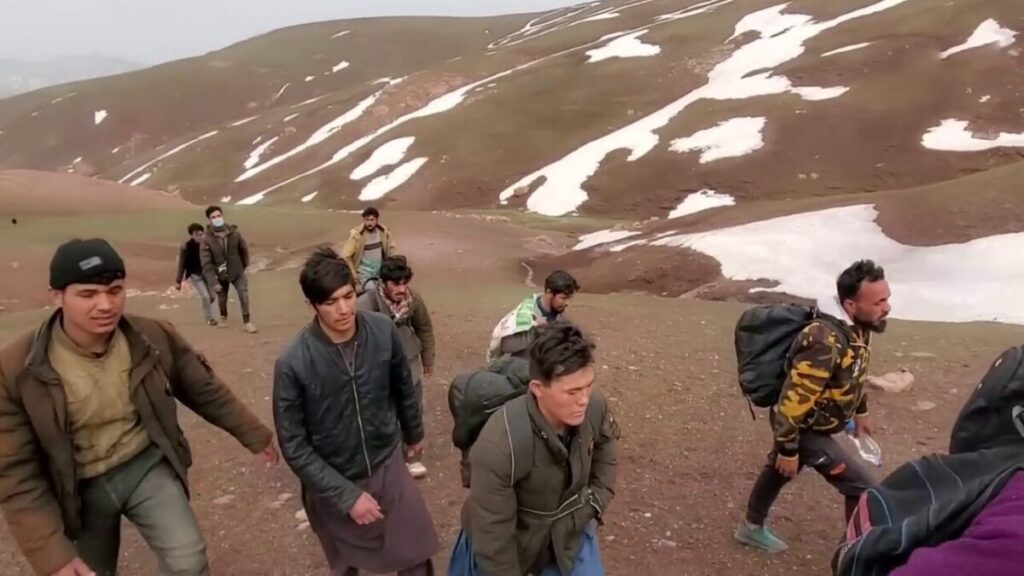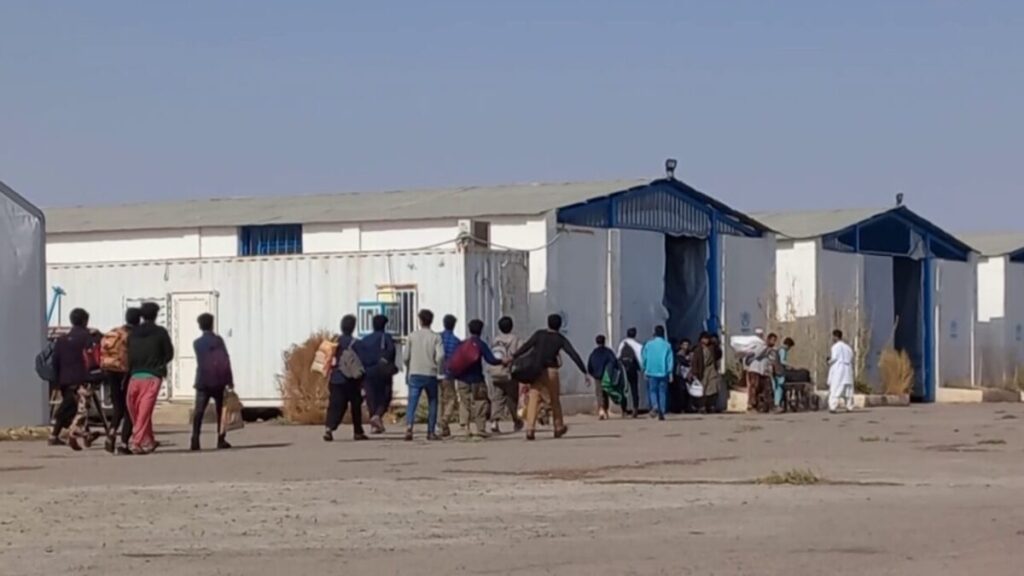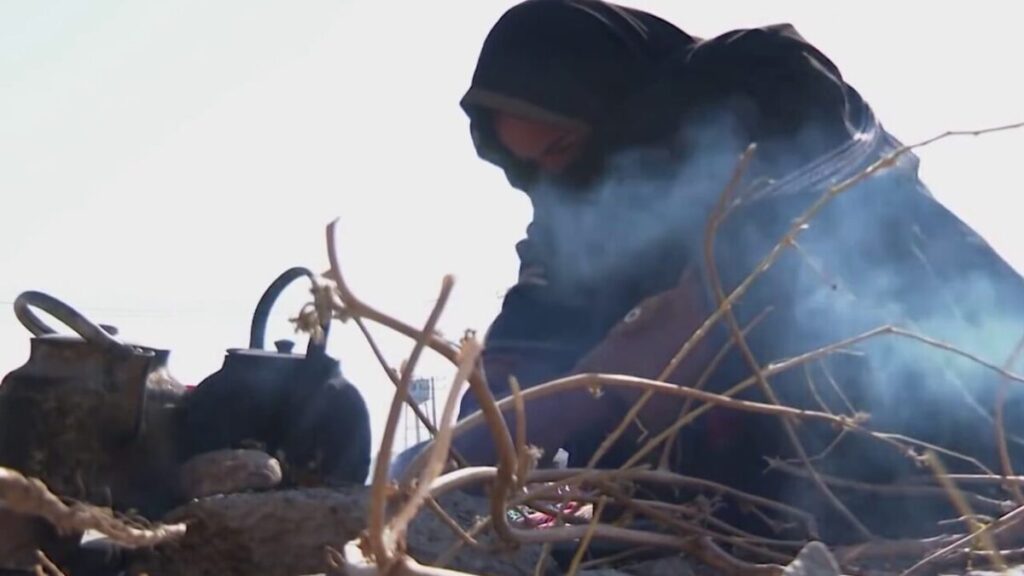KABUL, Afghanistan — Human trafficking networks have infiltrated migrant camps in Afghanistan’s neighboring countries, leveraging bribes and operatives posing as camp workers or migrants to exploit vulnerable individuals, according to a field study conducted by Amu, an independent research organization.
The study, based on interviews with 33 individuals across seven Afghan provinces, highlights the pervasive presence of trafficking networks in camps that host undocumented migrants. Of those surveyed, 63.6 percent described the influence of trafficking networks in these camps as “high,” while 30.3 percent reported it as “low,” and 6.1 percent identified it as “moderate.”
“Migrant camps, often established to manage undocumented migrants, have become fertile ground for human trafficking networks that exploit the dire conditions faced by residents,” the report said.

Bribes, operatives and false promises
Trafficking networks reportedly rely on bribes and intermediaries who pose as workers, such as janitors, bakers, or even fellow migrants, to maintain control. These operatives take advantage of the poor conditions in camps, offering false promises of escape or assistance in exchange for payment.
“Traffickers blend in. They may appear to be ordinary workers or even other migrants,” one interviewee explained. “They manipulate the situation to exploit those who are most desperate.”
The study found that 48.4 percent of respondents identified bribes as the primary tool traffickers use to maintain their influence, while 42.4 percent cited undercover operatives. The remaining respondents declined to answer or were unsure of the mechanisms.
For Qasim, one of the interviewees, the lack of money was a constant source of vulnerability during his time in a migrant camp. “Inside the camp, everything revolves around money,” he said. “If you don’t have it, even basic necessities like food are out of reach. A bag of chips that should cost 10 rupees is sold for 50. If you can’t pay, you go hungry.”

Manipulation and danger
The traffickers’ influence extends beyond financial exploitation. Many migrants reported being coerced into continuing their journey through illegal migration routes, despite the risks. Some traffickers promise freedom from the camps for a fee, only to subject the migrants to further exploitation once they are released.
“They promise escape and a better life,” said Saber, another participant. “But what they really deliver is more hardship and danger.”
The risks for those who engage with traffickers are significant. Migrants often face robbery, kidnapping, forced labor, sexual exploitation, and, in some cases, entanglement in drug or arms trafficking networks.
Jalal, who fell victim to human traffickers, described the lasting control they exert. “Even after you leave the camp, traffickers find ways to keep a grip on you,” he said. “They threaten you, steal your belongings, and manipulate you for their own gain.”

Broader criminal networks
The study also uncovered connections between human trafficking and other criminal enterprises, including narcotics and organ trafficking. Jawad, another victim, described how traffickers operate across multiple illegal industries.
“These networks don’t just smuggle people,” he said. “They’re involved in drugs and even organ harvesting. I’ve seen people lose everything—their money, their health, even their organs.”
For Murtaza, who spent time in a migrant camp in a neighboring country, the conditions were almost as dangerous as the traffickers. “The camps lack basic necessities—clean water, food, sanitation,” he said. “We received dry bread three times a day, and the shelters were infested with insects. It’s no wonder people turn to traffickers when they promise an escape.”

Tightening restrictions in neighboring countries
The challenges faced by Afghan migrants have been compounded by stricter policies in neighboring countries like Iran and Pakistan, which host large populations of undocumented Afghans. Both nations have increased detentions and deportations in recent years, often placing migrants in overcrowded camps before forcibly sending them back to Afghanistan.
In the past three years, economic and political instability in Afghanistan has driven a surge in migration to these countries. However, many migrants report harsh treatment at the hands of local authorities.
“Every day, the police detain dozens of undocumented Afghans,” said Zaki, another interviewee. “They’re sent to camps where conditions are appalling—confiscation of belongings, inadequate food, and constant abuse are the norm.”
For many, the deportation process is the final indignity. “After weeks or months in the camps, we’re dumped back in Afghanistan with nothing,” said one migrant.

Migrants’ narratives: Exploitation and abuse
The study included first-hand accounts from migrants who experienced life in the camps, many of whom spoke on the condition of anonymity due to security concerns.
Qasim, who spent months in a camp, described the pervasive corruption. “Everything depends on money,” he said. “The traffickers have so much influence—they can solve any problem if you can pay.”
Saber recounted how traffickers used their connections to secure releases. “If your relatives contact a trafficker, they’ll arrange everything,” he said. “They pay the guards, make a deal, and get you out.”
Jalal warned of the risks that await those who leave the camps with traffickers’ help. “The promises they make are lies,” he said. “You end up in worse situations—forced labor, sexual abuse, even trafficking in drugs or weapons.”
The narratives also revealed a darker side of trafficking networks. Jawad described how traffickers are involved in organ harvesting. “They don’t just move people,” he said. “They harvest organs and smuggle them.”
Murtaza, another migrant, emphasized the systemic nature of the problem. “Traffickers exploit Afghans every step of the way,” he said. “From the borders to the camps, they are always there, taking advantage.”
The study paints a grim picture of the situation facing Afghan migrants in neighboring countries, where trafficking networks thrive amid inadequate oversight and poor living conditions.





